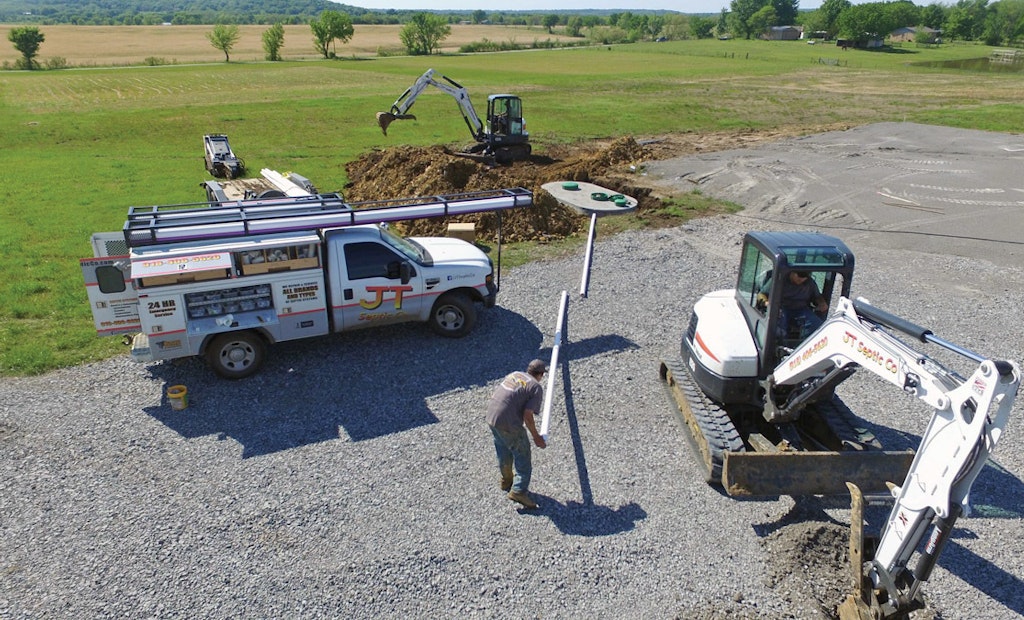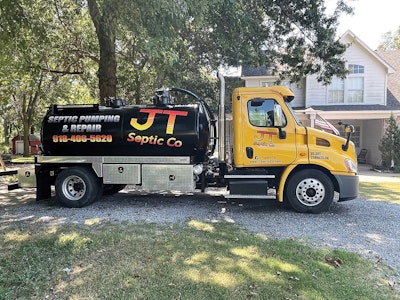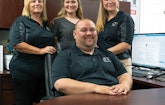
Michael Panther laying pipe for a Clearstream Wastewater Systems aerobic system, 2012 Ford F‑250 service truck; two Bobcat E55 excavators and a Bobcat stand-on skid-steer.
Interested in Education/Training?
Get Education/Training articles, news and videos right in your inbox! Sign up now.
Education/Training + Get AlertsIn Snapshot, we talk to a member of a state, provincial or national trade association in the decentralized wastewater industry. This time we visit a member of the Oklahoma Onsite Wastewater Association.
Name and title or job description: Jason Birdsong, owner along with wife, Erin
Business name and location: JT Septic Co., Claremore, Oklahoma
Services we offer: Installations, repairs, pumping, inspections, tank locating services
Age: 39
Years in the industry: 14
Association involvement: Member of the Oklahoma Onsite Wastewater Association since 2014. I am currently the president and have also served as vice president.
Benefits of belonging to the association: First and foremost are the relationships developed with the members, the board and the Oklahoma Department of Environmental Quality staff. We have been able to make strides in getting rules changed for the better. For example, when a law was changed to increase the number of sprinkler heads required for (irrigating with effluent from) aerobic systems in eastern Oklahoma, we helped get that reversed. It was very hard to fit more sprinkler heads onto small lots with big houses, and we could find no science to back up that requirement.
Our crew includes: Erin Birdsong, office manager; Greg Moore, outside supervisor/operator/installer; Michael Appleby, licensed installer/operator/pumper; Trey Dunlap, outside sales; Doug Chance, inside sales/customer relations; Michael Lewis, lead service technician/certified inspector; Tim Gramly, service technician; Justin Rhodes, installer technician; Devin Ellis, installer technician; Billy Duty, delivery driver; Michael Panther, ground support; Zachary Longnecker, pump truck assistant; Richard Sellers, mechanic; Brittany Welch, office support; Jae Chastain, office support; Dinah Thomas, office team leader/septic specialist; Charlotte Stein, accountant/controller.
Typical day on the job: Mainly I’m overseeing everything, making sure everything’s scheduled and going out the door, getting people directed in the morning. I fill in where needed, do paperwork and figure out where savings and efficiency can help us grow.
The job I’ll never forget: We put in an aerobic treatment system on a lake property with a hill down to the water. We had to install a tank prior to the house being built. We used a large excavator to hold onto the truck as we went down the hill. The excavator tracks were tracking fast in the opposite direction and the truck was just dragging the excavator.
My favorite piece of equipment: Our CASE 580L backhoe was one of the first big machines I bought. It’s hard to find someone who can run it these days, so if it goes to a job, I have to go with it. It mostly just sits in the barn as we have gone to mini excavators and skid-steers. But I love to get it out and play every now and then.
Most challenging site I’ve worked on: We like the jobs people can’t figure out. We just took over the maintenance of the onsite system at our local airport and it’s a mess. A lot of people have had their hands in this project, it was undersized when installed, and there have been changes made to it since. So it’s been a challenge. We’re slowly working through it but it’s going to take some time and money to get it right. They’re already looking at growth and I’m telling them they’ve got to fix what they have first.
Oops, I wish I could take this one back: I lost a conventional lateral line job. I went the wrong way with the laser, I read it wrong. It was a simple mistake but it wound up costing me the job — or even jobs because I think there were other jobs behind that one.
The craziest question I’ve been asked by a customer: It’s not really a question but a situation we came across. We showed up to pump a tank and it was full of large fish heads. Apparently the husband cleaned fish and the wife didn’t know what to do with them so she opened the tank and threw them in.
If I could change one industry regulation, it would be: The biggest issue we’re facing in Oklahoma is that anyone can install a septic system, and it only costs them $100 more for a permit and a state inspection than a licensed installer. This devalues our licensing and industry professionalism. The installer’s license I have in my wallet should mean to me what a license means to an electrician, plumber or HVAC tradesman. There’s also a huge problem with bootlegging where systems are being put in by people who don’t get a permit and there’s no inspection. These people haven’t gone to school to know what they’re doing. When systems fail and sewage starts surfacing and running into water impoundments leading into drinking water, that’s a huge issue.
Best piece of small business advice I’ve heard: I’ve had two major mentors for this occupation. My friend, Brian Gates of Gates Septic and Excavation, laid out a cellphone and said, “How many options does a customer have in purchasing that cellphone?” I said, “One.” He said, “No, there are two — they can purchase the cellphone or choose not to buy from you.” Then he laid out two cellphones. “How many options do they have now? They have four — they can buy either one, buy both, or none at all.” This helps me every day — to offer multiple options to my customers. Another mentor, Kevin Ruark of Red Dirt Septic, told me that my mindset of, “I don’t want to grow any more with any more employees,” restricts our ability to grow financially.
If I wasn’t working in the wastewater industry, I would: Probably still be a repo man. I used to repossess cars and it just got too dangerous. When I got into the septic industry, I had a wife and a new daughter. They are the reason I get up every day and I don’t want them to have to do anything without me.
Crystal ball time – This is my outlook for the wastewater industry: In Oklahoma we really have to change the mindset regarding education, licensing and professionalism in the industry. I love this state, I love my community, but we are behind the times and as president of the association I’m going to strive that we get caught up with other states on these issues.







